Martin Lake's Blog, page 15
April 12, 2013
Historical Novelists Book Fair 12-15 April

Francine Howarth is hosting a four day Historical Novelists Book Fair for the period 12 – 15 April on her Romancing the Blog site.
Click on the link below to go to her site to find out more about the other other writers featuring in the book fair. http://ow.ly/jZ69F.
If you’d like to read my books, and I hope you do, they are available world-wide on Amazon Kindle, Kobo, Nook, Apple, Sony Readers, Computers, Tablets and Smartphones.
Retailers include Amazon, Kobo, Barnes and Wallace for Nook, Diesel, WH Smiths and Smashwords.
My novels are priced at $2.99 or equivalent, my short story collections at 99 cents or equivalent..


April 11, 2013
Talking with Harvey Black about his new novel, ‘Red Effect.’
Last year I did a series of talks with authors. I am delighted to announce that I am going to continue this fascinating series on a regular basis.
Today I am delighted to post from Harvey Black which focuses on his new book, ‘Red Effect’ which is out now. You may also want to take a look at my talk with him from November 8th 2012.
Harvey, what started you writing?
I have wanted to write a novel since I was a teenager. Enthralled by Tolkien’s Lord of the Rings, E.E. Doc Smith’s Lensmen series and Edgar Rice Burroughs, I felt sure my first would be of the SF genre.
Joining the army changed all of that and my passion now is for military history. ‘Devils with Wings’, a military thriller, based around the adventures of two young Fallschirmjäger paratroopers during the early part of World War II, is a fictionalised adventure based on the famous assault on the impregnable Belgian fortress, Eben Emael.
What makes your books special?
I try to visit the locations in person. For Devils with Wings: Silk Drop, I walked the routes, up to 18 miles, in Crete, during the hottest part of the day, where my characters would have marched. Most of the descriptions in the novel, of what they can see, was written in situ.
I have just finished the first of my Cold War trilogy of novels, The Red Effect. Having spent a number of years in British Army Intelligence during the Cold War years, I have a deep insight into the undercurrents and flashpoints that occurred between the Soviet Union and the West.
What authors inspire you?
I have number of authors I follow, ranging from Stephen Leather, Simon Scarrow, Bernard Corwall, Gerald Seymor to Ian Rankin. Since I have been writing my own novels, I have played a close interest in newer authors, such as S.J.A.Turney and Stephen England. I am currently reading ‘Marias’ Mules’ IV.
What are your future plans?
There will be ten books in the ‘Devils with Wings’ series, Book 4, will be published towards the end of the year. The Red Effect now finished, I will focus on Book 2, The Black Effect, where the confrontation between East and West continues.
What will you do differently next time?
More structure to my chapters in advance, focus on my characterisation and improving my dialogue, key to keeping the story moving.
What lessons have you learnt so far?
Edit, edit, edit! Even when you have your editing done professionally, you still need to check your manuscript again and again.
Out in April – The Red Effect.
Thank you very much, Harvey.
You can get a copy of Harvey’s novel by clicking on one of the link below.
http://www.amazon.co.uk/The-Red-Effect-Cold-ebook/dp/B00BWX7YUI/ref=tmm_kin_title_0?ie=UTF8&qid=1365536748&sr=8-1


April 7, 2013
‘Beguiled’ Part 2 of my new work in progress. #SampleSunday #histnov
Despite his words I was not summoned by the King for seven days. I counted them off with care. The warm weather waned and an autumn chill crept across the Palace. I began to think he had forgotten our meeting and pondered how best to arrange a second one.
No good ideas came to me and I did not want to tarry in halls and chambers like some love-sick child anxious to meet their beloved. I cudgelled my brain for ways in which to meet him, to no avail. Then, one evening, when a fierce wind rattled the windows and a storm could be seen growing in the west, a servant appeared in the Queen’s chamber.
There were half a dozen of her ladies in the room. Her favourites were not here as she had summoned them to her bed-chamber. Her time was near and she would not rise again until she had given issue. I fiddled with an embroidery, a scene of hounds and hares as I recall, but I could not focus my attention on it. My thoughts were far away, veering between the memory of my meeting with Henry and the plight of the Queen in her chamber. I did not love Jane Seymour as I loved Anne Boleyn but as I’ve said before, we had once been friends.
A Page appeared in the chamber. He was young, perhaps thirteen or so, but that did not prevent the women in the room casting appraising eyes upon him. Thirteen year old boys became fourteen and fifteen. They grew at a prodigious rate.
‘Where can I find Alice Petherton?’ he asked. His voice was still that of a boy although I could detect the cracks in it.
I lifted my head. ‘I am Alice Petherton.’
‘You are requested by the King, madame,’ the Page said. ‘He awaits you in the King’s Study.’
He stood back, his duty done, embarrassed, uncomfortable. A buzz arose in the room, the sound that bees might make when their hive is being robbed.
I feigned more surprise than I felt although, in truth, I had all but given up on ever getting such a summons.
‘His Majesty requires that you bring the book of poems with you,’ the Page said.
This request, unusual and easily doubted, set the hive buzzing again.
‘Tell His Majesty that I must fetch it from my bed-chamber,’ I said. ‘Pray he forgives me for the slight delay.’
The boy swayed from side to side, uncertain what to do.
‘Well hurry,’ I said. ‘If I must keep him waiting it were best you did not as well.’
The boy blushed, cast a quick look at the ladies in the room and raced away.
‘Be careful, Alice,’ Margaret Crane said. ‘The King grows heavier and is said to ride his horses hard.’
The buzz became laughter, the yelping of puppies in a kennel.
‘I bid you good-night, dear friends,’ I said with a bow.
‘Read sweetly, dear Alice,’ said Susan Dunster. ‘Be careful not to make any mistakes.’
I gazed at her. She gave nothing away by her look but I hoped that she was giving me honest advice.
I hurried to my chamber and found the book of poems. My hand was shaking as I poured a jug of water into a basin. I dabbed a cloth in it and wiped my face. Then, thinking more clearly, I slipped my garments off and swiftly washed my body. I caught up a mix of herbs and spice and chewed upon them ferociously before spitting them out into the basin. Above all my breath must smell fresh and pure.
****************
This is my second foray into the turbulent world of the Tudor age. The first novel languishes on my computer. I don’t know where Alice Petherton came from. She entered my mind one morning this week when I sat down to write. Unbidden, fairly complete but full of surprises. I’m looking forward to knowing her better.
Related articles
‘Beguiled.’ The opening scene of my new work in progress (martinlakewriting.wordpress.com)


April 3, 2013
‘Beguiled.’ The opening scene of my new work in progress
To be a servant at the court of King Henry is to live with your heart in your mouth. This is so whether you are young or old, male or female. I am young and I am female. So the danger to me is considerable.
The danger is the more acute because I am pretty and the Queen is in the last month of her confinement.
Henry has divorced one wife and executed the second. But that is far from the whole story. A string of shattered hearts lies across the land like a pearl necklace broken in rage. Aye, it’s true that complicit fathers, brothers, uncles and even husbands have got rich by leading their women like heifers to the courtly market. It is the women who give the most and suffer the most grievously.
Unless of course, they are clever.
It does not do to be too clever. Anne Boleyn taught us this. For make no mistake, King Henry is more clever than any man in the kingdom now that Thomas Wolsey is dead. And he is as subtle and wily as even the most cunning of women. Boleyn’s head rolling from the block is testimony to that.
The trick is to show your cleverness to just such a degree that Henry is intrigued by it but not threatened. The second trick is to intimate that your cleverness is at his disposal and command even more than your own. And the third trick? Ah, the third trick is to be willing to bed the great beast of appetites and to know when to do it.
My name is Alice Petherton and I am nineteen years of age. I came to court as a simple maid but I caught the eye of Anne Boleyn when she was newly crowned. I was good at singing, could dance like an elf and made her laugh and think. She made me one of her Ladies-in-Waiting and my slow approach to the furnace began.
I was fond of Anne Boleyn. She was not pretty but there was something alluring about her, some promise of carnality which affected all who knew her, King and subject, man and woman. I must confess that on more than one night I awoke hot with sweat having dreamed I had been bedded by the Queen, worn out and used by her, alive and half-deadened, exultant and dismayed. There came one morning when she stroked my cheek and kissed me swiftly on the lips. I gazed into her eyes that day, telling her that I was willing. But she merely laughed and commanded me to get on with my sewing. So are we played with by those we must learn to call our betters.
I will become that better, I determined, I will be fawned upon and bowed to some day.
Not that I aspire to be a queen, you must understand. That is too deadly by far. Henry appears to be in love with Jane Seymour. He would, of course, for she carries his child. His greatest lust is for a male successor; even more than for any pretty face and shapely form. There is no sense in seeking to usurp Seymour’s place, no hope. If she proves to be a good brood mare then he will rest content for a little while. But in the meanwhile he hungers. The furnace grows hotter by the hour.
I gathered up my book of verse and strolled across the lawn.
It was the third week in September but the weather continued unseasonably warm. King Henry was alone in a bower of roses now shrivelling on the branch. The autumn winds blew fallen petals about his feet, hither and tither, skittish as a filly. 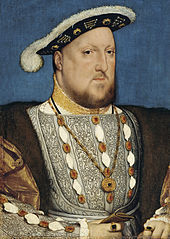
Jane Seymour was herself one of Boleyn’s Ladies-in-Waiting and had once been my friend so the King had acquaintance of me.
I did him a curtsy and made to walk on.
‘You have a book, Alice Petherton,’ he called. ‘Is this for decoration or education?’
I curtsied once more and glanced up at him before looking at the ground demurely.
‘For education, Your Majesty,’ I said in a low voice. ‘I seek to improve myself.’
Out of the corner of my eye I saw his eyes slide from the book to my breasts and then to my hair.
‘Don’t bend your head to the ground, child,’ he said. ‘Your King will not harm you by his gaze.’
I took a breath and raised my head. The newly risen sun illuminated the lower part of my face but my eyes remained in shadow.
I saw his chest move, as if a wind of passion was surging within. He held out his hand for the book.
‘Poems by the Earl of Surrey,’ he said, perusing the title. He flipped open the pages. ‘Do you like the Earl’s poems, Alice Petherton?’
‘I do Your Majesty. They are ably writ.’
Henry’s eyes narrowed and his head turned as if he could not believe his ears. ‘Ably writ?’ he said. ‘A chit of a girl talks of my foremost poet, an Earl of the Kingdom, in such a manner?’
I curtsied again. ‘I meant no disrespect,’ I said.
‘Perhaps what you mean and what you say are very different matters, Alice Petherton?’
‘They are not designed so, Your Majesty. It must be my youthful ignorance.’
He said nothing but continued to stare at me. The sun had risen higher now and dissolved the shadows which had hidden the top of my face.
‘You have very dark eyes,’ the King said. ‘Very dark. And yet your hair is blonde and your complexion pale.’
‘Many have remarked upon this, Majesty.’
‘They are black as sloes,’ he continued. He gestured me closer and stared into my eyes. I felt the heat of him beating down upon me, or perhaps it was my own heat, gusting like a wind in summer. ‘Yes, very like sloes. Dark eyes are hard to read, don’t you think, Alice Petherton?’
‘Not as hard as the work of the Earl of Surrey, Majesty.’
He stared at me again, a quizzical look upon his face. I saw his emotions battling, his thoughts flying. Then he tilted back his head and laughed. It was a pleasant laugh, not loud, not soft; as natural a laugh as a King could make. Yet as he laughed his eyes locked fast upon me.
I smiled, a gentle smile, as if I smiled not at my own words but at my lord’s pleasure.
His laughter stopped. He stared at me as if had not seen me until this moment.
When he spoke again his voice was changed, deeper and cloying.
‘I would know you better, Alice Petherton,’ he said. ‘I would read poems with you.’
‘I am at Your Majesty’s pleasure,’ I said, giving another curtsey. But as I did so my eyes never left his face.
Related articles
V&A shows Henry VIII’s stone leopards – complete with telling tails (guardian.co.uk)


March 31, 2013
‘Humble yourself, Edgar. Eat dirt.’ #SampleSunday #HistNov
 The month of June came in with a blaze of heat. The air felt warm and consoling and the light was more clear and fresh than any I had remembered before.
The month of June came in with a blaze of heat. The air felt warm and consoling and the light was more clear and fresh than any I had remembered before.
‘You didn’t get summers like this under old King Edward,’ said Godwin with a whistle, early one morning. ‘We should all get down on our knees for having such a wonderful king.’ He paused and stared at me. ‘I wonder what weather you will bring when you become king.’
I punched him on the shoulder. I was finding it increasingly hard to know whether he was being serious or a clown.
Then, out the corner of my eye, I saw Oswald gesturing urgently to us from a doorway.
I don’t know what instinct made me do it but I stilled the temptation to rush across to him and strolled instead. When we reached him he touched his finger to his lip and beckoned us into the deep shadows behind. Athelstan was waiting there.
‘Be silent and listen,’ whispered Oswald. He glanced around as if the walls themselves were spies. ‘Edwin and Morcar have fled the court and raised a rebellion against William.’
‘Never,’ I said.
‘Just listen,’ Oswald hissed. ‘What you do next may prove the life or death of you.’
My heart began to race at his words. ‘Immediate suspicion could fall upon you,’ he whispered. ‘William is in the worst rage anyone has ever seen but also in a sweat of fear. He is like a ravening wolf, thirsting for blood.’
Tears suddenly clouded my sight. I had felt adult for a long while now but suddenly all I wanted was to be held by my mother. ‘What should I do?’
‘I am not sure of the best counsel,’ continued Oswald. ‘But I think it best if you make your presence known to William right away. He will fear that you’ll join with the rebels so you must be in his sight at all times.
‘Humble yourself before him, Edgar, eat dirt. It is the only way you can survive.’
I glanced up at Athelstan. I could see that he was uncomfortable with Oswald’s words but he did not contradict them.
‘Now be gone,’ said Oswald. ‘Be natural and act surprised when told the news.’
He turned to his son. ‘Godwin, guard Edgar with your life. Your own life is as nothing now. I hold you to this.’
Godwin nodded and turned to me, his eyes shining.
We walked out into the sunlight. My head was whirling with the news. I saw my feet step one in front of the other, could feel the hot sun upon my head, yet it was as if I was trudging slow through a clammy nightmare.
Where was William? If I was to follow Oswald’s advice it was vital that I find him straightaway. But if he was in such a rage as Oswald described he may well slay me before I had chance to prove my loyalty.
I turned to look at Godwin and felt my eyes confused and pleading for help. He stared back at me, his own eyes full of sorrow but helpless, quite helpless.
‘What shall I do?’ I whispered at last.
‘I don’t know, lord,’ he said.
I stared at him in silence, stunned. Why are you calling me lord, I wanted to scream. I’m just a boy, I’m just a boy. Jesus help me but I want to be safe.
I saw Godwin’s head turn from side to side as if assassins waited at every turn.
‘We must hurry,’ he said. ‘We must get to William right away.’
All at once my head became clear. In front of my eyes I saw a golden meadow, hot under the sun. And far in the distance I saw a shining sea. A gnarled old thorn tree rose out of the waters, a golden crown hanging from a branch.
I looked into Godwin’s anxious face.
‘No,’ I said. ‘We must flee.’
*******************
The Lost King: Resistance is the first of the series of books about Edgar Atheling, heir to English throne in 1066. It is available as an ebook for £1.92, $2.90 or €2.68.
Related articles
Defiance in the West. #SampleSunday #HistNov (martinlakewriting.wordpress.com)
Everything has changed. #SampleSunday #HistNov (martinlakewriting.wordpress.com)
Envoys from Duke William #SampleSunday #histfic (martinlakewriting.wordpress.com)
The Journey to Battle. #HistNov #SampleSunday (martinlakewriting.wordpress.com)
The Start of a Life-Long Friendship. #SampleSunday #HistNov (martinlakewriting.wordpress.com)
‘We’re going to fight the Normans.’ #SampleSunday (martinlakewriting.wordpress.com)


March 26, 2013
Our Deepest Fear
When I was training teachers I read that at his Inaugural Speech Nelson Mandela had spoken some inspiring words about overcoming our fear of our greater natures. I used to quote from Mandela’s wonderful words as I thought them a useful thing to tell to young people.
I then found out that I had been misinformed and that Mandela had not written the words at all. In fact, he was quoting from ‘Our Deepest Fear’, a poem by Marianne Williamson from her book, ‘A Return to Love.’
Today, I had another shock. I found out that Mandela never quoted from the poem at his speech. His sentiments and message were similar but the words were not the same. I apologise for misleading people in the past. But I’m not too repentant; at least people heard the poem.
As a historical novelist I am intrigued by how facts can morph into supposed facts that are actually fiction. And how fiction can morph into what is perceived as fiction.
Nevertheless, both Mandela and Williamson’s words are worth remembering and worth quoting. I shall quote from the poem today. Marianne Williamson’s book, ‘A Return to Love’ can be found on Amazon and at other retailers. 
Here’s the poem.
Our Deepest Fear
By Marianne Williamson
Our deepest fear is not that we are inadequate.
Our deepest fear is that we are powerful beyond measure.
It is our light, not our darkness
That most frightens us.
We ask ourselves
Who am I to be brilliant, gorgeous, talented, fabulous?
Actually, who are you not to be?
You are a child of God.
Your playing small
Does not serve the world.
There’s nothing enlightened about shrinking
So that other people won’t feel insecure around you.
We are all meant to shine,
As children do.
We were born to make manifest
The glory of God that is within us.
It’s not just in some of us;
It’s in everyone.
And as we let our own light shine,
We unconsciously give other people permission to do the same.
As we’re liberated from our own fear,
Our presence automatically liberates others.


March 24, 2013
Defiance in the West. #SampleSunday #HistNov
Four days later we approached the walled town of Exeter. To my joy I saw the flag of Wessex flying bravely from its walls.
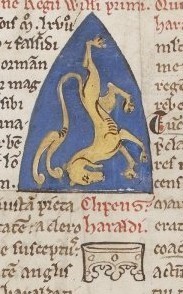
English: Harold Godwinson (Photo credit: Wikipedia)
‘A gold purse to the soldier who brings me that rag,’ William announced. Then he sent forth a herald to parlay with the defenders while he sat at ease with Odo and Roger de Montgommery.
There was much calling to and from the walls but eventually a small sally door opened and out rode two men, both in fine robes and riding handsome horses. One held aloft a white flag as sign of truce.
When they got close the two Englishmen dismounted and approached on foot.
William stared at them in silence while Roger spoke.
‘What foul disobedience you show to your lord and master,’ he said. ‘Explain yourself and hope that the king has cause to show you some mercy.’
‘We do not come to plead,’ said one of the men, calmly. ‘We come to find out the reason why this army is camping outside our city.’
‘The cause should be apparent to even the most simple of an Englishman,’ sneered Odo. ‘But perhaps they have sent the lord of simpletons to parlay with us.’
The man turned to look at Odo. ‘I am neither simpleton nor Bishop,’ he said. ‘I am Athelstan, thegn of the lands you are camping on.’
‘These lands belong to King William,’ said Roger. ‘You owe him your fealty.’
‘I owe nothing to a man whose lordship I do not recognise,’ said Athelstan quietly. ‘Had I lands in Normandy I would bend my knee to him. But not in England.’
The other man looked at Athelstan with queasy alarm, his hands gripping tighter on the flagstaff.
‘You impudent serf,’ cried Odo.
‘Thegn,’ said Athelstan, ‘I would be called a baron in your land.’ His grey eyes held Odo’s unwaveringly, until the Bishop cursed and looked away.
‘Your title is immaterial,’ said de Montgommery. ‘The matter under discussion is why the citizens of Exeter have risen up against the king and why you have chosen to give sanctuary to the mother of Harold Godwinson, the usurper of the throne.’
‘Gytha Torkelsdotter is an old lady who has chosen to spend her last days in this city. She has not sought sanctuary.’ Athelstan gave a questioning look. ‘Is there any need for her to do such a thing?’
‘Forget the old bitch,’ cried Odo. ‘We want to know why Exeter has risen up against the king.’
‘Ah,’ said Athelstan. ‘That is simple. We do not recognise him as king. We will pay him the tribute that we used to pay to the rightful kings of England but we will not give him fealty and nor will we allow him to enter our walls.’
There was a silence which lasted for a long, long moment.
‘I will enter,’ cried William. His voice was as quiet as snow falling on fields. ‘I will enter when you throw your gates open.’ He smiled at Athelstan, almost like a father smiles indulgently upon his son.
‘Or,’ William continued, ‘if you persist in defying me, I will enter marching through the guts of your people.’
The quiet menace hung in the air like a stench.
‘I think that this audience is at an end,’ said Athelstan.
William stared at him for a moment, almost as though he had not understood his words.
‘By God,’ he exploded. ‘I will decide when this audience ends and no other. Seize them.’
At this a dozen of his knights sprang at the two heralds. Athelstan drew his sword and fought back fiercely, slaying one of the knights and wounding two. The other herald wailed in terror and fled, leaping upon his horse and galloping like the wind back to the city.
In a moment Athelstan was overcome and lay prostrate before William who was speechless with fury.
‘Force will gain you nothing,’ said Athelstan. ‘We do not recognise you.’
‘You do not recognise me,’ William choked out at last. ‘Then recognise nothing more.’ His face worked fearsomely. ‘Kill him,’ he cried.
‘Hold,’ cried Montgommery. The knights hesitated at the word.
He turned to William. ‘My lord, this man is a herald and a brave man at that. I beg you, do not harm him. I will pledge good conduct for him.’
William held Montogommery’s gaze for a moment his eyes bulging from a face as red as sunset. Then he nodded curtly. ‘As you wish. But I will teach these rebels a lesson they will not forget,’ he said. ‘Bring me one of the hostages.’
Two of the knights hurried off and ran back, half dragging the fattest of the hostages with them.
‘Blind him,’ cried William.
The hostage shrieked as he was thrown to the ground. One of the knights held his head firm while a second raised a dagger above his head. But he paused and then turned to look at William. ‘Do it,’ he cried, striking one clenched fist into his palm.
The knight shuddered but plunged the blade into the right eye-socket, worked it back and forth, slashing and cutting until the shredded eye slid out. Then he drew out the blade and did the same to the left eye.
The hostage’s screams echoed over the army and the walls of the city.
I turned away in horror, struggling not to vomit.
‘He was a hostage,’ I heard Athelstan say, coldly.
‘And so are you,’ said William curtly. ‘Remember it.’
From the walls of the city came a huge cry of disgust at what the Normans had done. I glanced back at the rest of the hostages who stood looking on aghast. ‘I expect they think they will be next,’ I whispered to Godwin.
‘I don’t care about them,’ he muttered. ‘I care about us.’
‘I think we are safe,’ I said.
Godwin turned and looked at me as if I was mad.
***************
The Lost King: Resistance is the first of the series of books about Edgar Atheling, heir to English throne in 1066. It is available as an ebook for £1.92, $2.90 or Eur 2.68
Related articles
Envoys from Duke William #SampleSunday #histfic (martinlakewriting.wordpress.com)


March 17, 2013
Everything has changed. #SampleSunday #HistNov
I cannot recall much about the cold winter of 1067. Snow fell heavily and ice seized the ponds and streams near the house where Oswald, Godwin and I were lodged. I wrote a message to Duke William asking that my dog Rip be sent to me but received no reply. I missed him more each day for he would have loved to run after snowballs and roll in the drifts. Then, at the beginning of February, a party of Normans appeared at our door. At their head was Robert de Comines, one of William’s leading barons. He was tall and as tough looking as a bear and at close quarters he smelled like one as well. A jagged white scar ran from his temple to his jaw and it was said that the Frenchman who had given it to him was still clinging to life in the cess-pit of de Comines’ castle, fifteen years after the battle.
He scowled at me as he entered the hall and threw the letter I had written down upon the table.
‘You want your dog back, I see.’ He sneered. ‘You would do well to remember that when you seek favours from your lord you should address him properly. He is King William.’ He pointed to where I had written the word Duke. ‘King William. King of England. My king. Your king. Remember it.’
He stared menacingly at Oswald. ‘You must learn to tutor the youngster better, Englishman,’ he said. ‘Or we will find a fitter guide for him.’
He strode to the door, nodded to one of the soldiers and left. The soldier slipped out of the door, then returned and dropped a bundle on the floor. I heard a snuffling from the bundle and pulled back the cover. A huge bark sounded in my ear.
‘Rip,’ I cried. He leapt out and began to lick my face from chin to brow.
Finally the days began to warm and lengthen and the catkins appeared upon the trees. But there was less joy for me at the approach of spring than there had been in the past. Godwin, Rip and I began to spend most of our time out of doors but wherever we went Norman soldiers lumbered after us. They were unfriendly shadows, ones we could shake off no more than our own familiar ones.
One morning in mid-March, Godwin and I were skimming stones across the mill pond when one of the soldiers hurried down towards us. ‘The King is here,’ he said. ‘He commands your presence.’
I nodded and skimmed one last stone into the water. I began to walk back to the house and then stopped. This was the first time that I had heard the word king and thought, not of Harold, not of myself, but of William. I was stunned by this realisation.
‘Are you alright?’ asked Godwin.
I nodded. ‘I’ve just realised how everything has changed, and me along with it.’
Godwin frowned. ‘I guess we will all have to get used to it,’ he said.
I glanced at him. It was the first time I fully realised that I was not the only one who had been grieving for the passing of our old world.
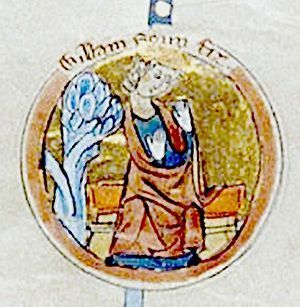
English: William I, Duke of Normandy (Photo credit: Wikipedia)
We entered the hall and found King William perched on the edge of the table. He was deep in conversation with fitz Osbern. Scribes sat near by, feverishly scrawling out commands upon parchment.
William looked up as we entered. ‘You grow taller, Edgar,’ he said. ‘They must be feeding you well.’
‘I cannot complain,’ I said. ‘My lord,’ I added, after a pause.
William noticed the delay and his eyes gleamed. He held my glance for a long moment and then quickly stood up.
A sudden fear gripped me, I felt like turning and running away. But I remained where I was. ‘You sent for me, lord,’ I said.
‘I did,’ he said. He clapped his hands together and smiled. ‘I have been long away from Normandy and it is time that I returned to see that all things are in order. I would like you to accompany me. We will not be away from England for very long.’
I said nothing immediately. I didn’t think for a moment that he was requesting I go with him or that there was any way that I could refuse. But I knew somehow that the manner of my going would be important to me. ‘I am honoured, lord,’ I said after a moment. ‘In what way can I serve you when we are there?’
William laughed and clapped his hand upon my shoulder. ‘Do you hear that, fitz Osbern?’ he said. ‘Earl Edwin thought he would be taken to Caen in chains. Not Edgar. He wants to know how he can serve me.’
‘He seems to have a good head on his shoulders,’ said the steward, gruffly but not unkindly.
‘Mark that, Edgar,’ said William. ‘Praise from William fitz Osbern. Treasure the memory, note who is here so that they can bear witness in the future.’ He gazed at me long. ‘He is almost always right.’
‘Always,’ said fitz Osbern, ‘always.’
William laughed out loud. It was genuine laughter and so infectious that, despite myself, I started to laugh with him.
***********************
The Lost King: Resistance is available on all e-readers. The third novel in the series will be available later this year.
Related articles
Envoys from Duke William #SampleSunday #histfic (martinlakewriting.wordpress.com)
The Journey to Battle. #HistNov #SampleSunday (martinlakewriting.wordpress.com)
The Start of a Life-Long Friendship. #SampleSunday #HistNov (martinlakewriting.wordpress.com)
Outcasts: The Knighting of the Commoners #SampleSunday #HistNov (martinlakewriting.wordpress.com)


March 10, 2013
Envoys from Duke William #SampleSunday #histfic
From the Norman army three men came riding slowly across the meadows towards us. The two men at the front were dressed like holy men, although underneath the garments of one I thought I could detect a glimpse of mail. The third, a herald holding a flag of truce, was dressed in full chain mail, a great black cloak billowing behind him.
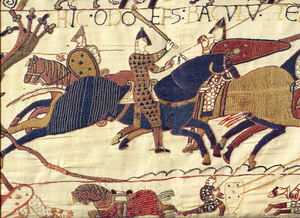
A detail from the Bayeux Tapestry illustrating Norman knights in combat half a century before David’s reign. (Photo credit: Wikipedia)
‘Envoys from Duke William,’ said Oswald quietly. ‘But I do not think they are coming to sue for peace.’
Suddenly, with a tumult of hooves, the three men approached our foremost ranks. They halted a few yards away and one rode forward and called in a clear loud voice. ‘I come to parlay with the leaders of the English.’
I stared in utter astonishment. The envoy was Archbishop Stigand.
‘He must have been captured,’ I mumbled.
Oswald shook his head. ‘He must be a traitor,’ he said.
For a long breath no one in the English army moved. Then one horse stepped out from our centre and stood facing the Norman envoys. It was Morcar. A second horse broke ranks further to the left and trotted along the front of our army. I could see even from this distance that it was Edwin. When he reached his brother they bent their heads together for a while. Then, together they trotted out until they were half way between our men and the Normans. The five men spoke together for what seemed an age.
I heard a warning voice speak urgently in my head. ‘I should be there,’ I said to Oswald.
Oswald shook his head once. He did not speak but his hand reached out and grasped firm hold of my horse’s bridle.
Still the five men spoke together, their words a mystery to all the host of men watching. Then Morcar looked down the ranks. He kicked savagely at the flanks of his horse and came racing towards me. I felt Oswald’s grip tighten. Behind me I heard a long, low scraping noise. My Housecarls were sliding their swords from their scabbards.
I gazed intently at Morcar when he got close. His face looked drained of all blood and there was a strange, fay look in his eyes. ‘Edgar,’ he said quietly, ‘these men are envoys from the Normans. One is Odo of Bayeux, half-brother of Duke William. The other is Archbishop Stigand. They say that Duke William desires no more bloodshed and that he will embrace peace if we submit to him and acknowledge him to be our king.’
‘But I am the king,’ I said. My lips felt like ice.
Morcar did not answer. I looked up at Oswald. He stared impassively ahead, avoiding my gaze.
I turned back to the earl. ‘Morcar, tell me what I should do. I am the King of the English. The Witan proclaimed me so and I am of the blood of Alfred. Surely we should fight? What do you think? What should we do?’
For a long minute Morcar did not answer. Then he glanced back at the ranks of Englishmen as if weighing up their strength and courage.
‘Morcar?’ I whispered.
He shook his head sadly. ‘Our best warriors were slain at Hastings,’ he said quietly, ‘and our greatest captain lies dead beside them. We have no warrior like Harold here to lead us. Until today I thought we should fight but now I see the strength of the Normans I begin to doubt. My brother is older and wiser than I and he counsels that we submit to Duke William.’
He paused and said bitterly. ‘Archbishop Stigand has done so already.’
Tears flooded my eyes. The world receded into a silent mist and all I could feel was the scalding heat of the tears and the sickness in my heart.
A gloved hand reached out for my shoulder. ‘You are brave young Edgar,’ said Morcar. ‘But the time for bravery is past. Now you must be wise as well. We must submit to the Normans.’
I blinked the greyness away from my eyes and gazed at him. ‘What must I do?’ I asked.
‘Ride with me to the envoys and they will take our message to Duke William.’
‘No,’ said Oswald.
Morcar’s eyes flashed angrily.
‘Be silent,’ he said. ‘What business is it of yours to speak?’
‘Edgar’s safety is my business,’ Oswald said. A low growl sounded from a hundred throats behind me. Morcar glanced quickly at the Housecarls and lifted his hand to placate Oswald’s anger.
‘So what would you have us do with him?’ he said. ‘Do you think that Duke William will be happy to see his rival for the throne slip away from this field?’
‘That is Duke William’s concern and not mine,’ said Oswald.
Morcar leaned across his saddle and spoke close to Oswald’s face. ‘Well it is my concern. Duke William is not the only one who wishes to avert bloodshed. I have fought two battles already this year and watched too many brave men drown in their own blood. Do you wish for more deaths upon your soul? Do you wish it upon Edgar’s?’
‘Stop,’ I cried. ‘Stop quarrelling.’
I turned to Oswald and shook my head. ‘I think that Morcar is right,’ I said at last. ‘Harold is not here with us. And I do not think that you will allow me to lead the charge. So I shall go to the Normans and I shall submit to them. But I would like you to come with me, please.’ Then I began to sob.
Straight away Morcar spurred his horse forward and held his shield across my face. No one except Oswald and him saw me weep. I do not know how long I cried but at length I felt Morcar smooth my hair. ‘Have done, Edgar. We must go to the Normans.’
I wiped my nose and nodded.
I felt dazed as our horses trudged along the line towards the envoys. I rode in the middle with Oswald to my right and Morcar to my left. Behind us, unbidden, came a score or more of my Housecarls. At length we reached the centre of our army. Edwin glanced swiftly at his brother who nodded once. We lined up facing the Normans. On their left was Archbishop Stigand, on the right the silent warrior cloaked in black and in the middle the lean figure of a man of god dressed in chain. He stepped forward a pace and stared at me.
‘Bishop Odo,’ Edwin said to him, ‘this is Edgar Atheling, grandson of Edmund Ironside. Will you take a message to Duke William that Edgar and the Earls Edwin and Morcar submit to him.’
Odo stared impassively at Edwin for a moment and then turned to the silent man who sat beside him. ‘They submit to you, my brother, they submit.’
The man cloaked in black pulled off his helmet.
‘I accept your submission,’ he said. ‘Be my loyal subjects and I shall be your just king.’
I was face to face with Duke William of Normandy. He held the gaze of Edwin for a while, then looked Morcar up and down. At last he turned to look upon me. I was transfixed by his stare as if he was holding me captive merely with his eyes. He seemed to be trying to delve into my soul, to scan my every thought. I was a mouse cowering, ears flattened, watching helpless as the hawk swooped down to clutch.
‘I shall be a father to you, Edgar,’ he said at last.
I shuddered.
And then I felt immense gratitude flood over me.
****************
This sample is from The Lost King: Resistance, the story of Edgar Atheling’s long battle against the Norman invaders . It is available as an ebook on a large range of readers including Kindle, Nook, Kobo, Sony Reader, Tablets and PCs.
Use modern technology to transport you to an ancient world.
Related articles
The Journey to Battle. #HistNov #SampleSunday (martinlakewriting.wordpress.com)
The Start of a Life-Long Friendship. #SampleSunday #HistNov (martinlakewriting.wordpress.com)
‘We’re going to fight the Normans.’ #SampleSunday (martinlakewriting.wordpress.com)
Battle of Fulford tapestry goes on public display after six years of work (yorkpress.co.uk)


March 3, 2013
The Journey to Battle. #HistNov #SampleSunday
Oswald came striding towards us, leading his horse. He bowed his head quickly and smiled. ‘Are you ready, Edgar?’ he asked.
I nodded. He swung up into his saddle and the three of us trotted past the waiting men to the head of the army. There were over five hundred Mercians and half that number of Northumbrians, the soldiers of Edwin and Morcar. The rest of the men were from the local area and from London. Some attached themselves to one or other of the earls, others to me, and most to Asgar, Sheriff of Middlesex. I glanced around for Merleswein but then remembered that he had been sent back north to ensure its loyalty to me.
At the front of the army waited Archbishop Stigand, Edwin and Morcar and all of the leading counsellors of the kingdom. Just behind them were a group of about two hundred men clad in iron mail, huge battle axes hanging from their belts.
‘Housecarls,’ I breathed.
‘Yes,’ said Oswald. ‘Like me, these were the men who were wounded at Stamford Bridge and could not march with Harold to Hastings. They are recovered now and are here to guard you.’
I stared at them in wonder. I had assumed that all of the Housecarls had died with Harold. But here they were, the last remnant of the royal bodyguard, the best trained and most feared warriors in the whole of Europe. They sat like rocks upon their horses and my normal guards seemed diminished beside them.
‘All of their comrades are dead,’ said Oswald, ‘fulfilling their oaths to King Harold. These men have made the same oath to you. None will desert you; all will serve you to their death.’
‘Will they ride with me into battle?’ I asked in awe.
Oswald shook his head. ‘If you were to ride into battle they would. But we will not risk you in such a venture. You are too young and too important. No, at this battle, Edwin and Morcar will lead the army. The Housecarls will keep you safe in sight of the field but not on it.’
‘No,’ I cried. ‘I am the king and I must lead my army.’ Hot tears sprung up, burning my eyes. I did not want Oswald or Godwin to see this so I tried to blink them away. My sight grew foggy and in the end I had to wipe my eyes with my sleeve. ‘Like a baby,’ I thought to myself.
When my vision cleared the first thing I saw was Oswald, staring silently at me. There was sorrow in his eyes. ‘We cannot risk it, Edgar. We have lost one king already to the Normans. We dare not lose another. It will be the end of England.’
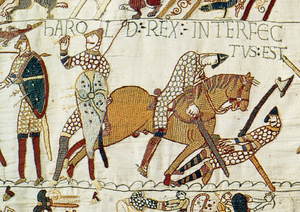
English: Harold Godwinson falls at Hastings. Harold was struck in the eye with an arrow (left), slain by a mounted Norman knight (right) or both. (Photo credit: Wikipedia)
‘But I’m not scared. I want to fight.’
‘Of course you do. You are the heir of Alfred and of Ironside. But today we must ask a greater courage of you. And that means not going into battle. It means staying safe, keeping out of harm’s way.’
‘But that makes me think that we’re not going to win the battle.’
I paused, waiting for a swift denial from Oswald. It did not come.
‘Oswald?’ I asked.
‘Battles are decided by God,’ he answered. ‘If it were down to the skill of warriors then William and not Harold would have died at Hastings. But it is God who decides.’
I turned my horse away. How could he talk like this?
Suddenly, in the distance, a horn blew. The hairs on the back of my neck rose up. It was a challenge, it was defiance, it was expectation.
I looked angrily at Oswald. He might doubt that we would win but surely the clamour of the horn promised victory.
Once more the horn blew and the army marched out.
It was a long while before I could speak again. The army had been on the march for over an hour and the weak sun had climbed high into the sky. Godwin started to talk about his friends and about his dog and I started to talk about Harold and how we used to play together on winter evenings before the feasting.
‘I wish I had met him,’ Godwin said.
‘He was my best friend,’ I said.
Godwin nodded thoughtfully.
Towards evening we noticed that a change had come over the army.
‘They have gone quiet,’ said Godwin.
I nodded and looked around. At the beginning of the march the men had seemed lighter-spirited, jostling each other, calling out and laughing. Now they marched in silence. Was this determination, I wondered? Or was it fear, or worse still, foreboding? Those who were not silent muttered into their beards, private words which they wanted none to overhear.
I began to feel anxious.
**************************
The Lost King: Resistance tells the story of the struggle against the Norman Conquerors. It is available worldwide from all Amazon, Kobo, Nook, Sony stores, Apple and WH Smith for $2.98. £1.92 or €1.68
The second book in the series, ‘Wasteland’ is also available. The third in the series will be published later this year.
Related articles
The Start of a Life-Long Friendship. #SampleSunday #HistNov (martinlakewriting.wordpress.com)
‘We’re going to fight the Normans.’ #SampleSunday (martinlakewriting.wordpress.com)








